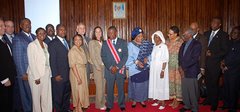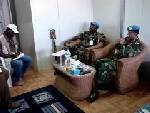
SPECIAL COURT PRESS RELEASE Freetown, 29 January 2007:
The trial of former Liberian President Charles Taylor is slated to begin this spring, as ordered by a Judge of the United Nations-backed Special Court for Sierra Leone.
The case against Mr. Taylor, who is accused of committing war crimes and crimes against humanity during the civil war in Sierra Leone from 1996 through 2002, will begin on June 4.
At the Taylor Status Conference held on January 26 at the trial venue in The Hague, it was announced that the date for commencement of trial had been changed from the original date of April 2 at the request of the Taylor Defence to provide additional time for its preparations.
Justice Teresa Doherty, who presided at the Status Conference, made rulings on several other matters, including the setting of the date for the filing of pre-trial briefs.
Taylor has pleaded innocent to charges of war crimes and crimes against humanity linked to the killing, mutilation, and sexual violence involving thousands of victims, as well as the recruitment and use of child soldiers.
Responding to reporters questions after the hearing concerning the nature of the Prosecution's case, Stephen Rapp, The Prosecutor, said, “The indictment alleged acts that included the most horrendous things humans can do to one another.
Whereas the other trials of the Special Court for Sierra Leone are being conducted in that nation's capital, Freetown, the Taylor case will unfold at the facilities of the International Criminal Court in The Hague. The Prosecutor noted that the decision to move the trial was a result of negotiations aimed to keep the peace in Sierra Leone and the region as a whole.
The decision was supported by the United Nations and the key governments in the region, including Liberian President Ellen Johnson-Sirleaf. Mr. Rapp emphasised that while the trial has been moved due to regional security concerns, it is the Special Court for Sierra Leone, and only the Special Court, that is conducting this trial.
I want to emphasise from the outset that this trial will be conducted first and foremost in the name of, and on behalf of, the people of Sierra Leone. Regarding concerns that the distance between The Hague and the Sierra Leonean capital would prevent the people of the country from witnessing justice being done, The Prosecutor spoke about the extensive Outreach programme of the Court.
Last year, 780 meetings were held in every region of the country to inform the public of the Court's work, Mr. Rapp commented. Every effort is being and will be made to ensure that Sierra Leoneans have transparent access to this trial. Each case at the Special Court is heard, argued and decided upon in their name, and the many miles between The Hague and Freetown will not change that.






